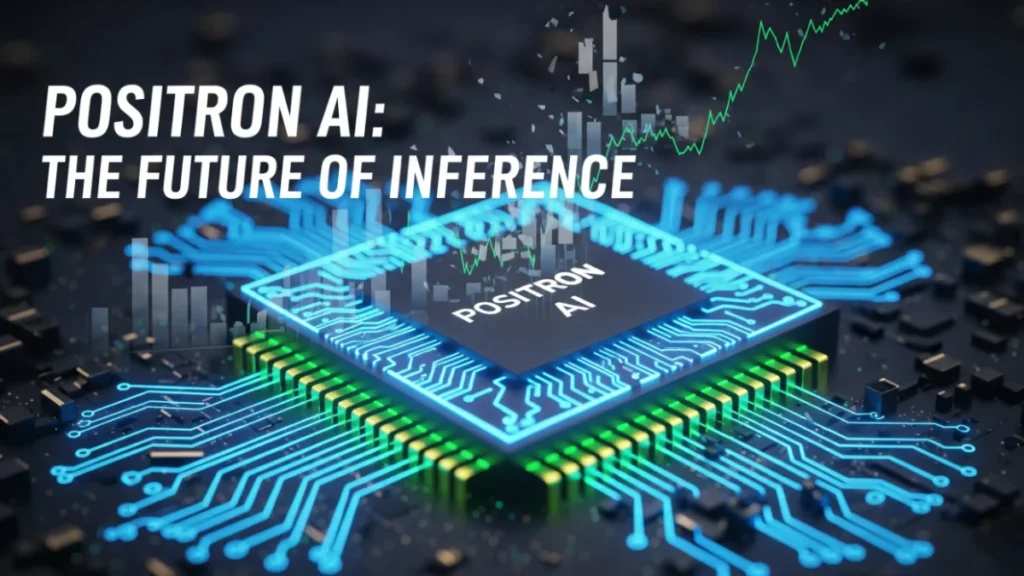Positron AI just raised over $51 million in a red-hot Series A to shake up the AI hardware world. Their U.S.-made chips promise faster, cheaper, and more energy-efficient inference than NVIDIA’s best. With major names backing them and Atlas already in production, this startup might redefine how superintelligence is deployed at scale.
Key Takeaways
- $51.6M Series A: Oversubscribed round led by top-tier investors.
- Atlas vs. NVIDIA: 3.5x better performance-per-dollar than H100 GPUs.
- American-Made Chips: Fully designed and fabricated in the U.S.
- Next-gen Titan in 2026: Will support 16-trillion parameter models.
- Energy Efficiency Focus: Up to 66% less power usage than competitors.
Positron AI Secures $51.6M to Rewire the Future of AI Infrastructure
In the race to power the world’s most demanding AI models, a Reno-based startup is quietly taking the lead with an unconventional approach. Positron AI, a rising player in inference-optimized hardware, has closed a $51.6 million Series A funding round, catapulting its total capital raised this year to over $75 million.
Led by Valor Equity Partners, Atreides Management, and DFJ Growth—with contributions from Flume Ventures and other heavyweight investors—this oversubscribed round signals deep confidence in Positron’s mission: to make AI inference faster, cheaper, and more energy-efficient.
Challenging NVIDIA with a Purpose-Built Alternative
With AI infrastructure spending projected to exceed $320 billion in 2025, companies are hunting for alternatives to the pricey and power-hungry NVIDIA GPUs that dominate the space. Positron’s answer? Atlas, a first-gen inference accelerator purpose-built for generative AI, not general compute.
Unlike NVIDIA’s multipurpose GPUs, Atlas is laser-focused on delivering AI inference—the process of generating responses, answers, or decisions from trained models. That focus brings significant gains: 3.5x better performance per dollar and up to 66% less power consumption than NVIDIA’s H100.
A Chip That Thinks Different
The real magic behind Atlas is its memory-optimized FPGA architecture, which hits 93% bandwidth utilization, far above the typical 10–30% in GPU-based systems. This design can handle models with up to 500 billion parameters in a single 2kW server. It’s compatible with Hugging Face transformers and even mimics the OpenAI API, allowing seamless integration into existing workflows.
And it’s not vaporware—Atlas is already deployed in production, powering use cases like LLM hosting, generative agents, and enterprise copilots.
“The early benefits of AI are coming at a high cost,” said Randy Glein, managing partner at DFJ Growth. “Positron focuses on inference—the most valuable and underserved layer.”
From Startup to Silicon in 18 Months
Founded in 2023 by Thomas Sohmers, Edward Kmett, and now led by former Lambda COO Mitesh Agrawal, Positron has moved at breakneck speed. With just $12.5M in seed funding, the team brought Atlas to life, validated its performance in real-world deployments, and secured enterprise customers.
The next phase? Titan—their second-generation system due in 2026, powered by custom ‘Asimov’ ASICs. It’s designed to handle 16-trillion-parameter models, shatter context length limits, and eliminate the bottlenecks that plague today’s AI infrastructure.
Strategic Customers and Market Confidence
Among the early adopters: Parasail, SnapServe, and Cloudflare—names that signal real traction, not just promise. Titan will also support parallel model hosting, allowing multiple AI agents to run on a single system—something GPUs struggle to do efficiently.
What sets Positron apart isn’t just silicon—it’s capital efficiency, technical depth, and a clear go-to-market plan. “They proved their software on 2022 FPGAs before even building a custom chip,” said Gavin Baker of Atreides Management. “That speaks volumes about their team and strategy.”
Why This Matters for AI’s Future
As demand for larger, more complex models grows, so does the cost to run them. With NVIDIA dominating the market and GPUs in short supply, the future of AI depends on purpose-built alternatives like Positron. Their energy-efficient, high-performance inference systems could democratize access to generative AI by lowering both operational costs and power requirements.
And importantly, their hardware is built entirely in the United States, offering a strategic edge in a landscape where supply chains and national security are increasingly tied to silicon.
Conclusion
In an era of skyrocketing AI infrastructure demands, Positron isn’t just another chip startup—it’s setting a new benchmark for how superintelligence can run, scale, and serve the world without breaking the bank or the grid.
